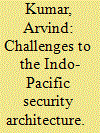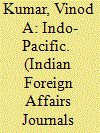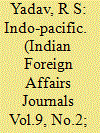| Srl | Item |
| 1 |
ID:
135808


|
|
|
|
|
| Summary/Abstract |
India should play an active role in seeking to address the challenges to the creation of a new and acceptable Indo-Pacific security architecture. Over the years, the aspirations and ambitions of India have grown. it has been acknowledged as a predominant power in south Asia, and an emerging power in the whole of Asia. Its desire to be a leading power in the Indian Ocean Rim cannot be questioned. However, India cannot shy away from assuming responsibilities and playing a more proactive and positive role, especially if it desire to an influential player in Asian and world affairs. India’s strategic orientations need to be adjusted to go beyond the Indian Ocean region to the Pacific Rim.
|
|
|
|
|
|
|
|
|
|
|
|
|
|
|
|
| 2 |
ID:
135809


|
|
|
|
|
| Summary/Abstract |
Inclusion of the IOP in the Indo-Pacific paradigm only underlines the coming future of great powers attempting to spread their writ in this expanse. Already reeling under continental security challenges, a looming economic crisis, and a tardy defence modernization process, India will need to toil in the coming years to sustain whatever leverage it already has. while economic consideration will be a driving factor in India’s efforts to enhance cooperative relations with major actors in the Pacific, the expectation is that it will be a mere fringe player in the strategic dimensions of indo-pacific for some time to come.
|
|
|
|
|
|
|
|
|
|
|
|
|
|
|
|
| 3 |
ID:
135807


|
|
|
|
|
| Summary/Abstract |
India’s interest in the Indo-Pacific region seem to be in terms of both its foreign policy priorities and its lack of capability as a major power. Through it is making progress in attaining the status of a rising power, yet it has to establish such a claim through a threefold manifestation in the form of its hard power position; its soft power status; and its demonstrative capabilities. Besides, Indian interests are more or less limited towards its immediate and extended neighbourhood.
|
|
|
|
|
|
|
|
|
|
|
|
|
|
|
|